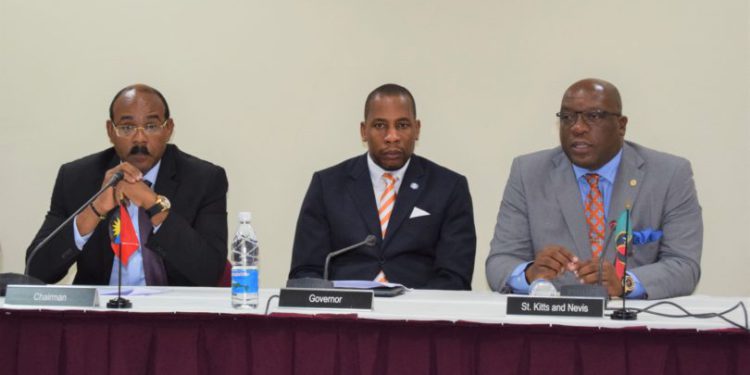Basseterre, St. Kitts, March 04, 2017 (SKNIS): Governor of the Eastern Caribbean Central Bank (ECCB), Timothy Antoine, is reporting that the ECCB is pleased that there are recent improvements in the fiscal performance of the Eastern Caribbean Currency Union (ECCU), some of which he attributes to improvement in economic activity, better tax administration and receipts from the Citizenship-by-Investment (CBI) programmes of several Eastern Caribbean countries.
Speaking at a press briefing at the just concluded 87th meeting of the ECCB Monetary Council held in St. Kitts on March 02, 2017, Mr. Antoine said that although this was encouraging, there are still challenges to be confronted if the ECCU is to keep its fiscal head above water.
“Generally, across the Currency Union, we have seen improvements in the fiscal economy, that is to say, for example, in 2015 overall there was a deficit (but) in 2015 to 2016, overall there was a surplus,” he said.
Mr. Antoine said that “improvement in economic activity always helps” and that the improvement in tax administration is not necessarily due to an imposition of additional taxes but that Inland Revenues are doing a better job of collecting revenue and that there is an increase in tax compliance. He also attributed the improvement in fiscal performance to CBI/CIP revenue flows.
“We said we see an increase in primary surpluses across the Currency Union, so that’s positive. That does not mean that our countries do not have challenges because the evidence of finance will tell you that there are collective revenues but there are also more demands and you still have to juggle and you still have to manage tight budgets,” said Governor Antoine, who was flanked by Antigua and Barbuda’s Prime Minister, Minister of Finance and Chairman of the Monetary Council, Honourable Gaston Browne, and St. Kitts and Nevis’ Prime Minister and Minister of Finance, Dr. the Honourable Timothy Harris.
A communiqué from the Monetary Council states “As at the end of September 2016, financial conditions in the Eastern Caribbean Currency Union had remained stable and resilient amid slow macroeconomic growth, uncertainty and a low global interest rate environment.”
It added: “Financial performance in the banking sector improved during the review period, mainly on account of the resolution of three commercial banks: the ABI Bank in Antigua and Barbuda and the National Bank of Anguilla and the Caribbean Commercial Bank (Anguilla) Ltd. Profits and capital increased from one year ago, the ratio of non-performing loans fell and liquidity remained at levels higher than the current minimum regulatory requirement of 6.0 per cent.”
Construction activity and an increase in tourist arrivals and travel receipts were also attributed to have boosted the economy.
The Monetary Council gave the hope that “the financial sector is expected to remain stable and resilient heading into 2017” but cautioned that “challenges such as the loss of correspondent banking relationships between some commercial banks operating in the ECCU and their international counterparts persist.”









